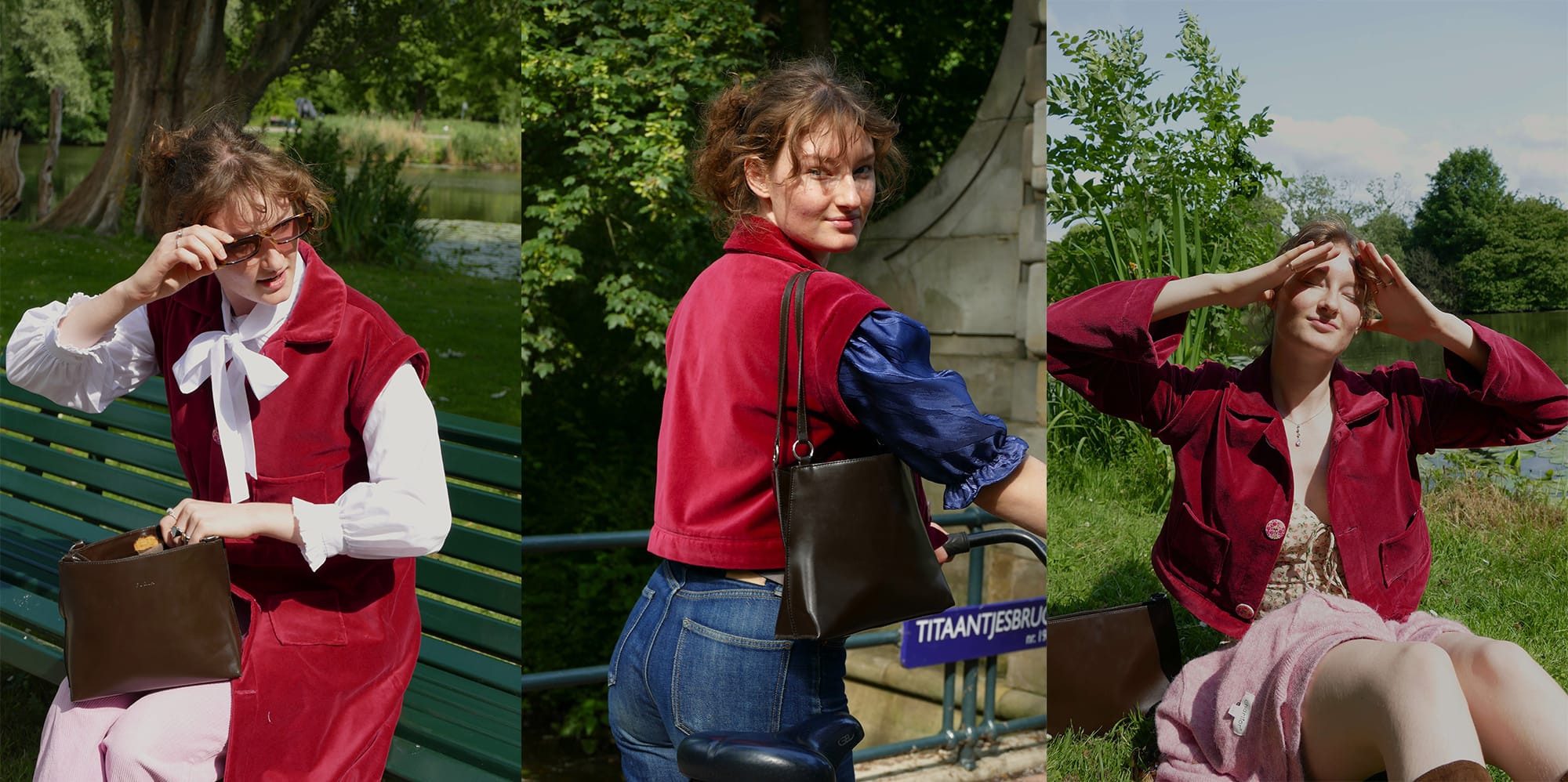Is fashion management just about logistics, or something much bigger?
At Amsterdam Fashion Institute (AMFI), it means far more than overseeing supply chains or chasing growth targets. The Fashion & Management programme challenges students to think critically about the systems that shape fashion and to design new ones. Blending business strategy with sustainability, ethics, and digital innovation, it prepares graduates to navigate complexity, question convention, and lead with purpose.
That mindset was front and centre at AMFI NEXT, where this year’s Fashion & Management cohort presented future-facing projects tackling everything from digital traceability and consumer co-creation to circular mindsets and ethical engagement. Whether policy-focused or platform-led, these concepts reflected a growing truth: the fashion industry doesn’t just need better products, but better systems.
From this group of emerging leaders, I’ve selected four graduates whose work captures the breadth of what fashion management can be. Whether operationalising sustainability through data, redesigning customer relationships, or using technology to slow down consumption rather than accelerate it, each offers a compelling take on how fashion might function differently - and more responsibly - in the years ahead.
Agnes Molgaard x Knots in the System – Mapping Power, Policy & Cotton Supply Chains
For Agnes Molgaard, sustainability isn’t a certification, but a question of responsibility. In Knots in the System, her self-initiated thesis, she investigates how European fashion brands can move beyond surface-level compliance to address the deep structural barriers that prevent equitable, traceable, and truly sustainable cotton sourcing.
Even when brands want to invest, the system itself prevents impact.
Her research began with a seemingly practical question: how can brands financially support sustainable cotton farming? But what emerged was a much more complex web. Agnes uncovered how opacity, fragmentation, and misaligned incentives make it nearly impossible for money to reach farm-level stakeholders - even when there’s intent to do good. The result is a policy-driven, systems-level proposal that calls on brands, regulators, and sourcing teams to work together toward more transparent and just supply chains.
Digital tools played a critical but carefully examined role in her project. From isotopic testing to the EU’s upcoming Digital Product Passport, Agnes sees traceability not as a flashy fix, but as an enabler; one that can align sustainability targets with on-the-ground realities. But she’s clear-eyed about their limits.
Technological solutions do not inherently question power structures.
She warns against viewing traceability as a silver bullet. Not only can these tools be prohibitively expensive for smaller suppliers, but without structural shifts in purchasing practices and value distribution, they risk becoming just another form of selective adaptation - helping those with capital while excluding the rest. For Agnes, true change lies in pairing innovation with intention: ensuring new technologies are matched by long-term commitment and systemic accountability.
Sustainable sourcing isn’t just about choosing a certified cotton blend. It’s about restructuring how value and risk are distributed.
The biggest challenge was realising there was no single fix. What began as a technical brief became a systemic investigation; one that required Agnes to shift from solution-hunting to system-mapping. Academic frameworks helped her zoom out and better understand the interaction between policy, sourcing behaviour, and the structural externalisation of responsibility. It’s a shift she believes more brands need to make.
Now graduating from AMFI, Agnes plans to continue her work at the intersection of business, policy, and sustainability. She’s heading into a master’s in sustainable business at a political science university, with a focus on how regulation is reshaping corporate decision-making. Cotton, she says, was just the start...
Connect with Agnes here.
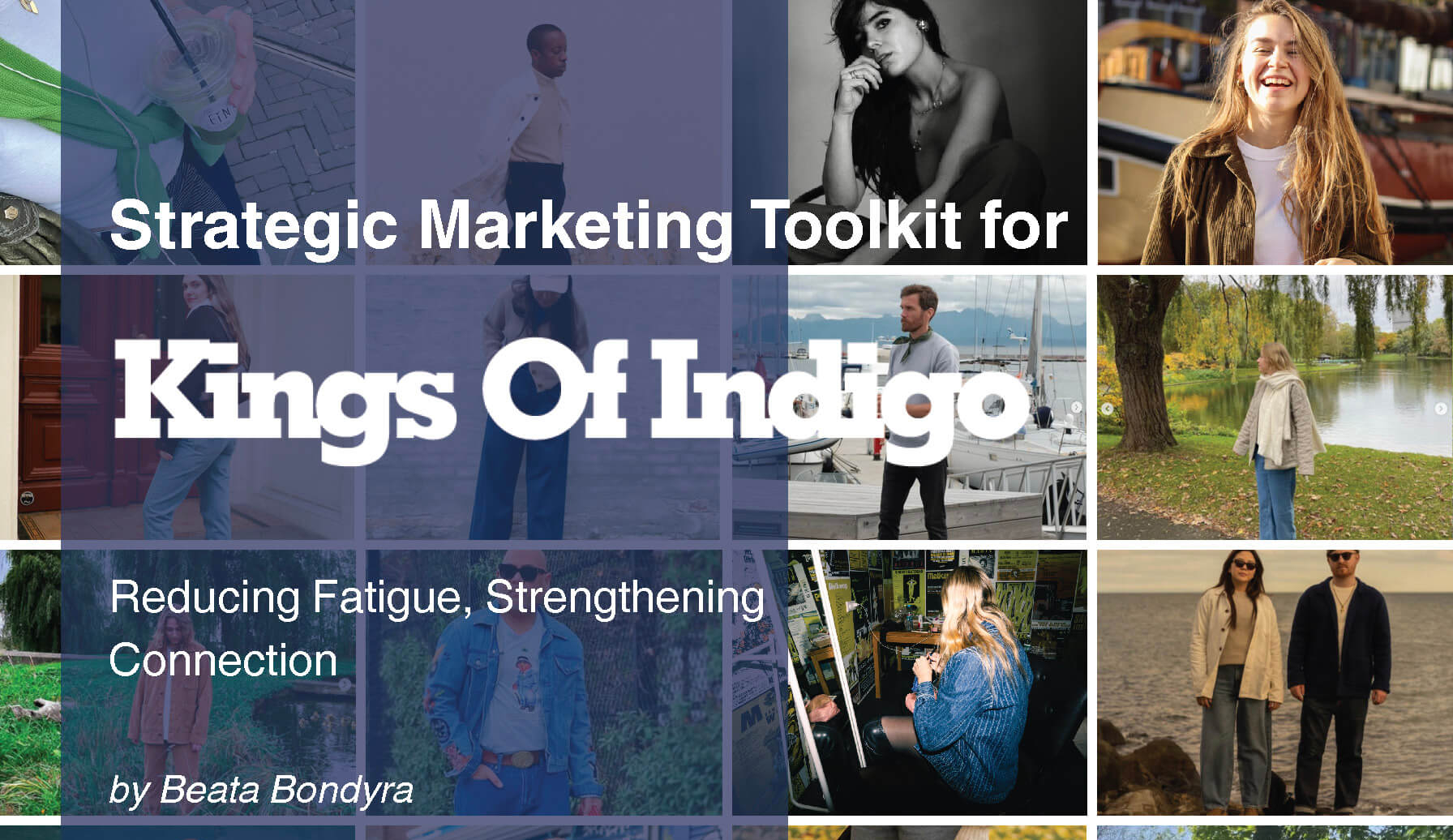
Beata Bondyra x Sustainable Engagement - Rethinking Digital Presence for Ethical Brands
For Beata Bondyra, digital marketing isn’t just a numbers game - it’s a human responsibility. Her graduation project, Sustainable Engagement, takes a hard look at how conscious fashion brands communicate online and asks: what happens when ethical intentions are delivered through extractive, fatiguing digital systems?
I was tired of mindlessly scrolling, even through content from brands I respected. Everything started feeling more numbing than nourishing.
And it was that personal fatigue that became the spark for her research. Her answer wasn’t to retreat from digital altogether, but to reimagine it. Part strategy report, part practical toolkit, Beata’s project blends academic insight with industry application. Using Dutch denim brand Kings of Indigo (where she now works) as a real-life case study, she developed a communication framework that balances clarity, care, and consistency; guiding ethical brands toward more mindful engagement.
The problem isn’t that we’re talking too much. It’s how and why we’re talking that matters.
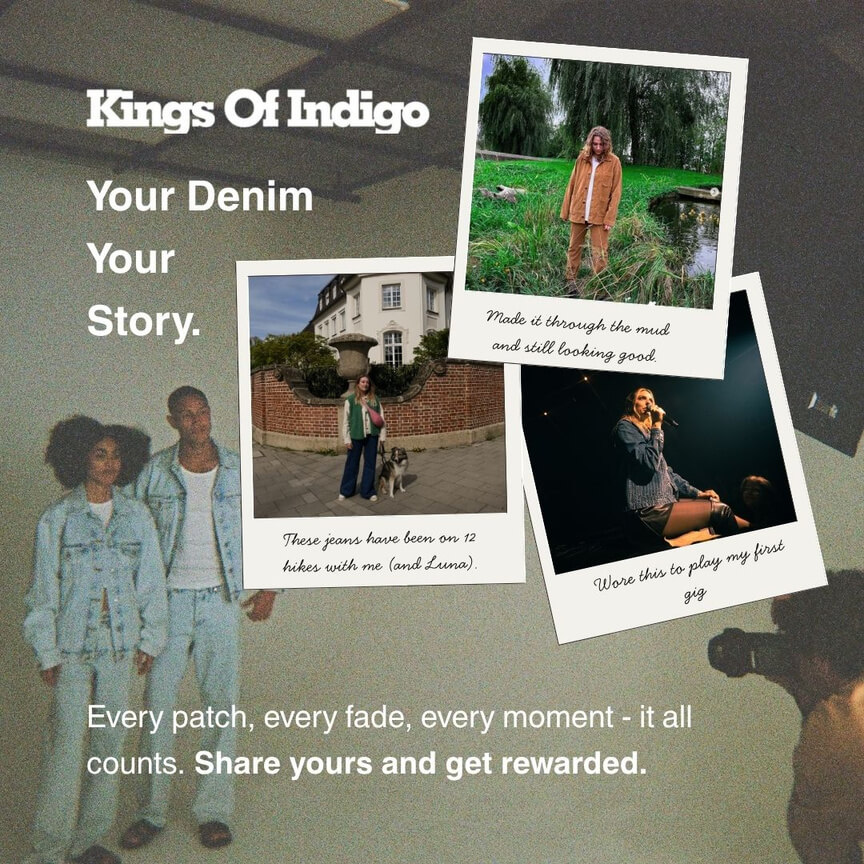
Beata investigated how content behaves on different platforms, what formats are rewarded by algorithms, and how real users respond to brand messages. Her surveys and interviews revealed that digital fatigue wasn’t driven by content itself, but by the feeling of being manipulated or bombarded. Many consumers said they muted or unfollowed brands that posted constantly, yet stayed loyal to those who made them feel understood and respected.
This insight shaped her entire approach. Rather than chasing engagement for its own sake, Beata advocates for slowing down, giving users more control, and communicating with intention, for example, by letting customers opt into “quiet mode” content or select how often they receive brand messages.
We don’t need louder campaigns - we need clearer intentions.
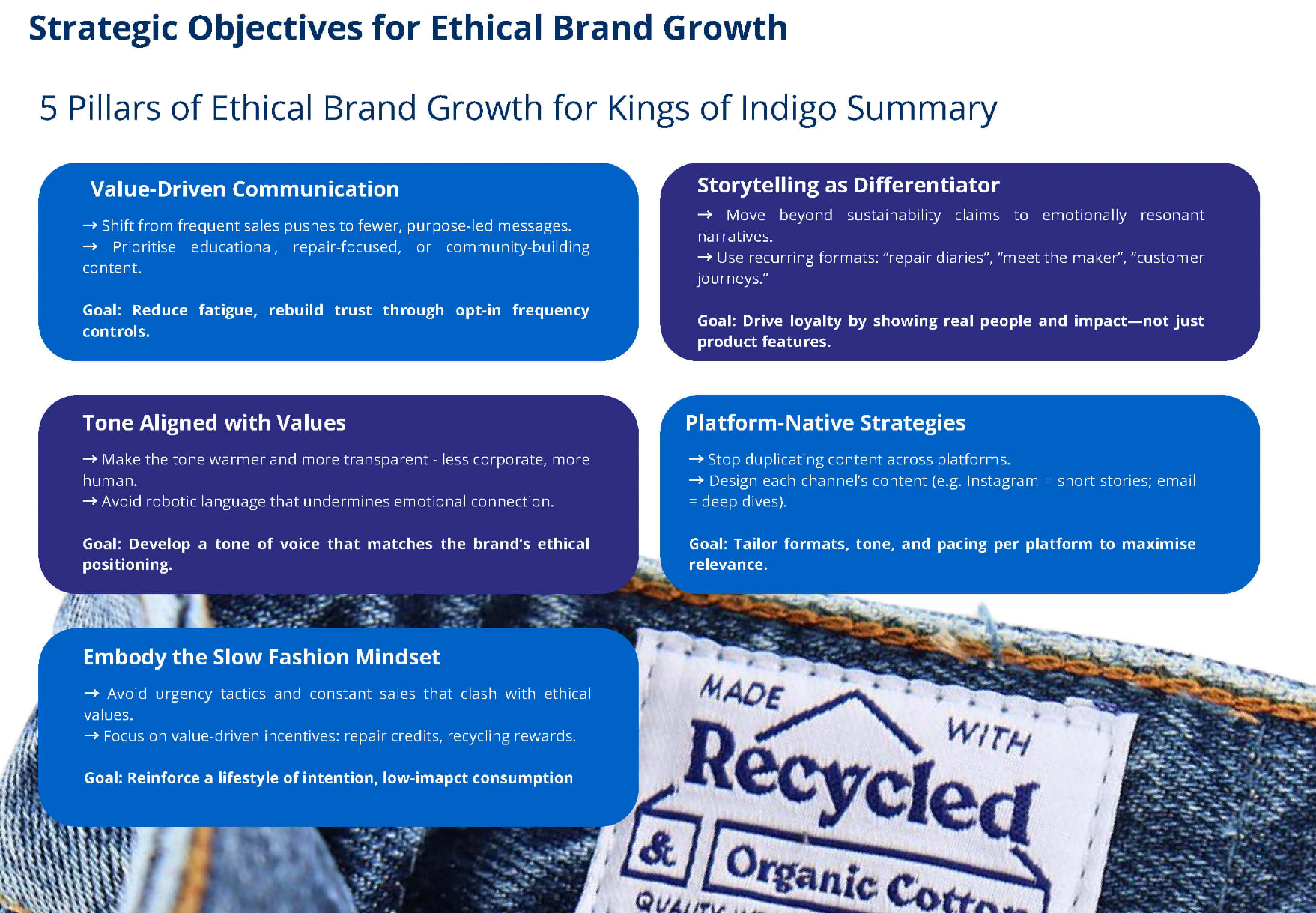
The most compelling part of Beata’s work is its practicality. Her toolkit doesn’t just critique the system; it offers tangible, scalable interventions for brands to implement immediately, from story-led content calendars to backend systems for better opt-out flows.
Of course, proposing a more mindful model in a results-driven industry came with its challenges...
I didn’t want to just say ‘do less'. I had to show what ‘doing better’ looked like - and make sure it worked both for the brand and for the person receiving it.
Now a Junior Marketing Manager at Kings of Indigo, Beata is actively testing her ideas in the real world, from rethinking campaign cadence to experimenting with community-driven events. Looking ahead, she hopes to continue shaping brand strategies that reject extractive attention models in favour of something slower, richer, and more human.
Respect is the new retention strategy.
Connect with Beata here.
Aimée Verhoeven x From Fast to Forever - Rewiring Consumer Habits Through Education, Emotion & Modular Design
What if slowing fashion down didn’t start with brands, but with behaviour?
That’s the question Aimée Verhoeven pursued in From Fast to Forever, a project that shifts the lens of sustainable fashion from production to consumption. Aimée’s research tackled the emotional, psychological, and historical roots of overconsumption, and how we might rethink the stories we tell ourselves (and others) about the clothes we wear.
“I realised that the most sustainable way to consume is to keep on wearing what you already have,” she says. And so, she designed an educational exhibition titled 'CHANGING PATTERNS – Unravelling Consumption', which blended awareness-building with action. The immersive concept guides visitors through the problem of waste, offers approachable advice for shifting habits, and proposes community-based solutions like styling and upcycling workshops.
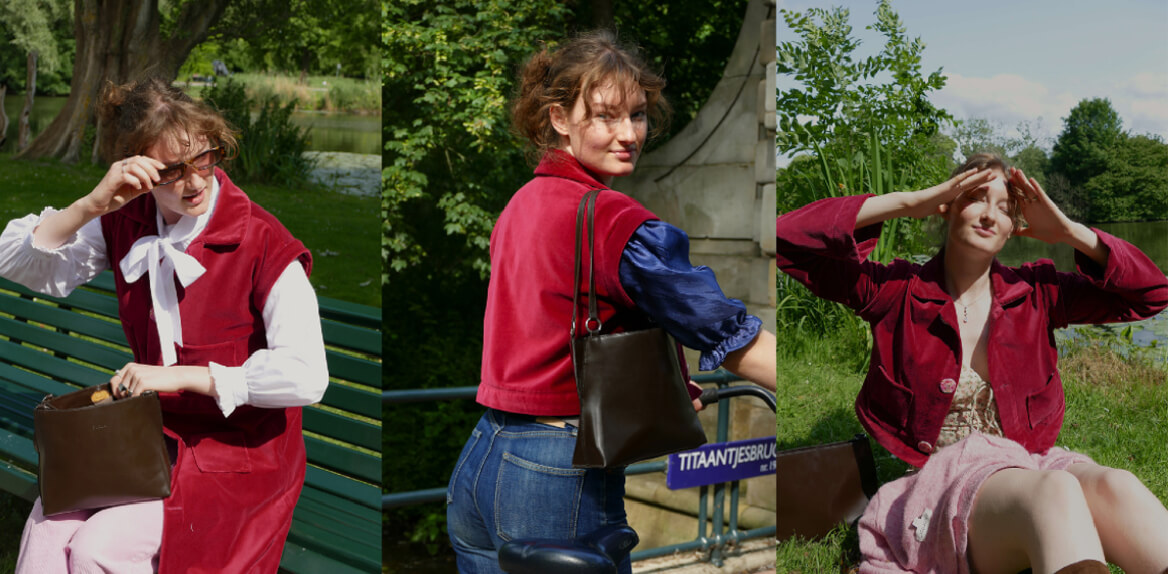
At the heart of the exhibition is her statement piece: a modular jacket made from a second-hand curtain, reimagined to be worn six different ways. With interchangeable parts, repairable design, and emotional longevity built into its DNA, it challenges the industry’s logic of constant newness.
We already have so much in this world - we don’t need to keep producing more.
Though not formally trained in design, Aimée taught herself the necessary pattern-making skills to bring her vision to life. Her final output may be fashion, but her methods are managerial: systems thinking, stakeholder testing, and user insights drove the concept forward.
Even people who didn’t know much about fashion’s impact were eager to learn and reflected on their habits. Some even told me they’d started wearing old clothes again after our interview.
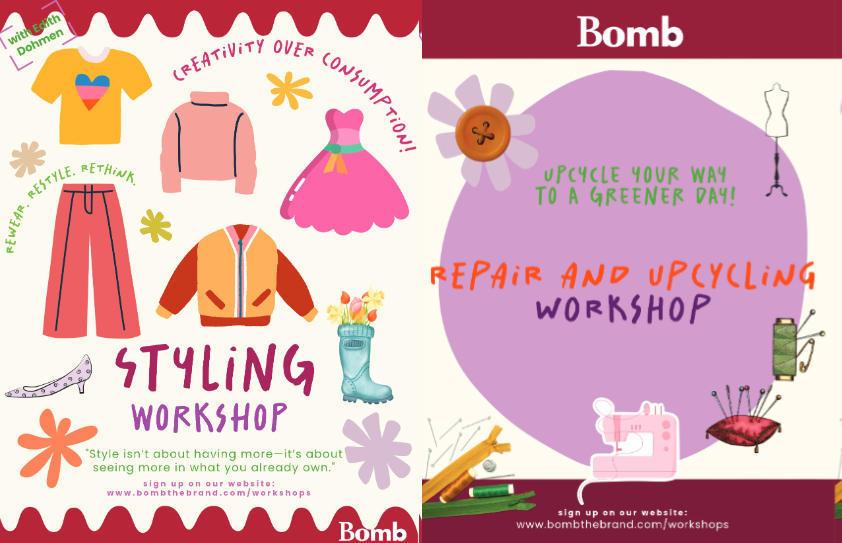
Aimée also sees huge potential for digital tools to deepen our emotional connection with garments. She imagines AI-powered systems that help consumers design modular elements, suggest upcycling ideas, or create new outfit combinations from existing wardrobes.
Tech can speed things up, but it can also help us slow down - if we use it with care.
Next up? A new role at ZEEMAN, where she hopes to keep learning how sustainability can work at scale and on a budget. “They prove that low prices are not an excuse to compromise on ethics'', she says. 'I’m excited to be part of that shift.”
Connect with Aimée here.
Madleen Morath x Younique - Personalisation as an Emotional Journey
For Madleen, the future of fashion isn’t faster, but more personal. Her graduation project, Younique, explores how brands can move beyond surface-level customisation to design emotionally resonant, co-creative experiences with Gen Z consumers. Blending psychology, technology, and storytelling, she invites us to rethink how personalisation can empower identity and build longer-lasting brand relationships.
I wanted to design a system that helps people see themselves in the product - and helps brands see value in that connection.
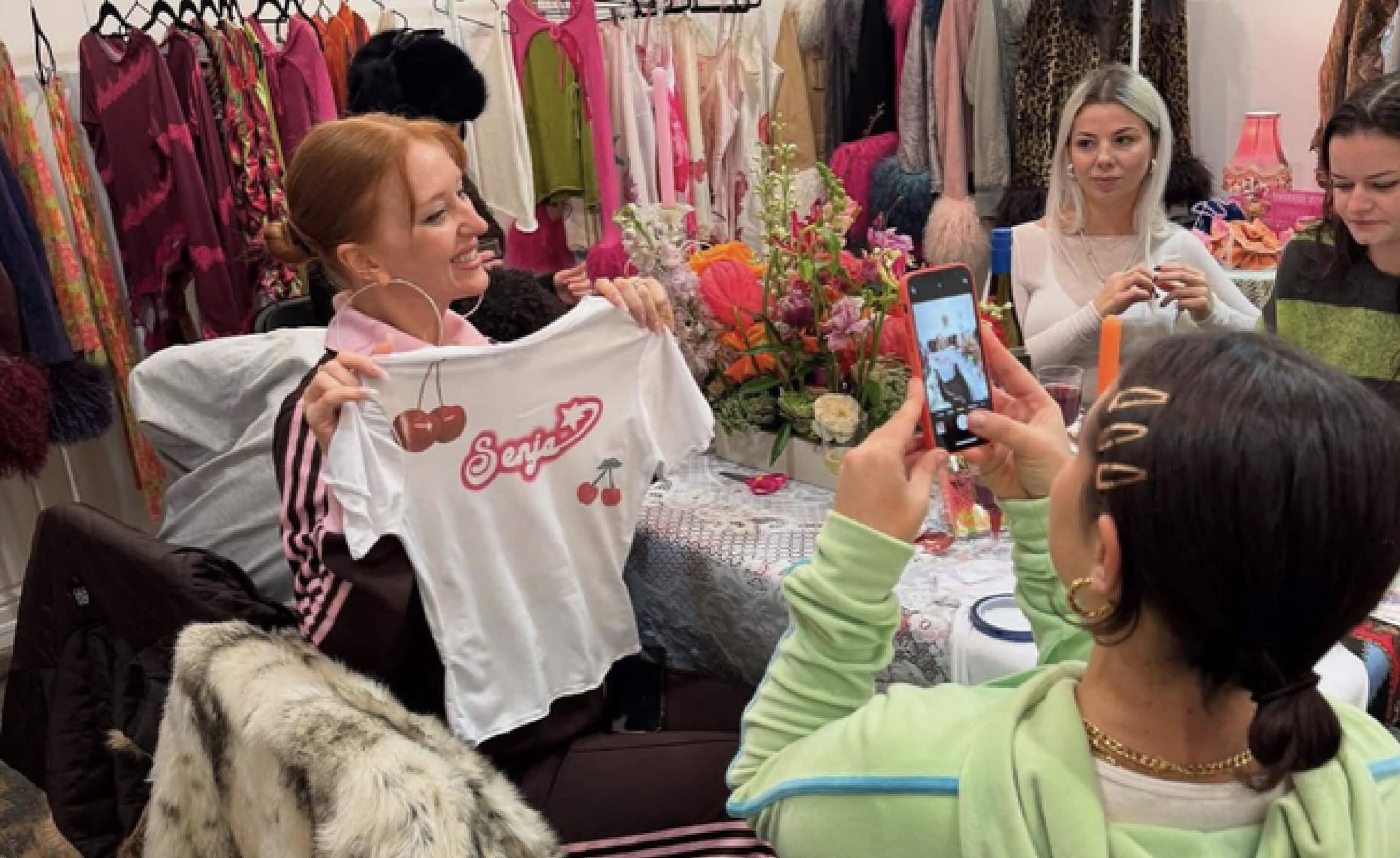
Madleen’s insight was rooted in behaviour: Gen Z doesn’t just want to buy - they want to co-create. She looked at how the act of choosing, modifying, and engaging with fashion pieces taps into self-expression and emotional attachment.
Her research revealed that when consumers shape a product themselves, they’re more likely to feel seen, valued, and loyal - not because the product is unique, but because the process made it theirs.
She combined this thinking with a layered system of digital touchpoints: interactive platforms, personal storytelling prompts, and modular design elements that shift consumers from passive recipients to active designers. But the goal wasn’t novelty for novelty’s sake. Instead, Madleen built Younique as a strategy, one that deepens connection while remaining scalable for brands.
It’s not just about the outcome - it’s about the experience of making it yours.
Her final concept moves beyond limited-edition drops or monogrammed tags, advocating for co-design experiences that are thoughtful, intuitive, and emotionally sticky. By embedding storytelling prompts into customisation flows, Madleen’s toolkit shows how brands can invite their customers to become co-authors, rather than just buyers.
At the heart of it all is a deceptively simple belief: you are what you wear.
With Younique, Madleen reminds us that personalisation isn’t a gimmick - it’s a gateway to empathy, expression, and more meaningful engagement. It’s a strategy that doesn’t just shape products but reshapes relationships.
Connect with Madleen here.
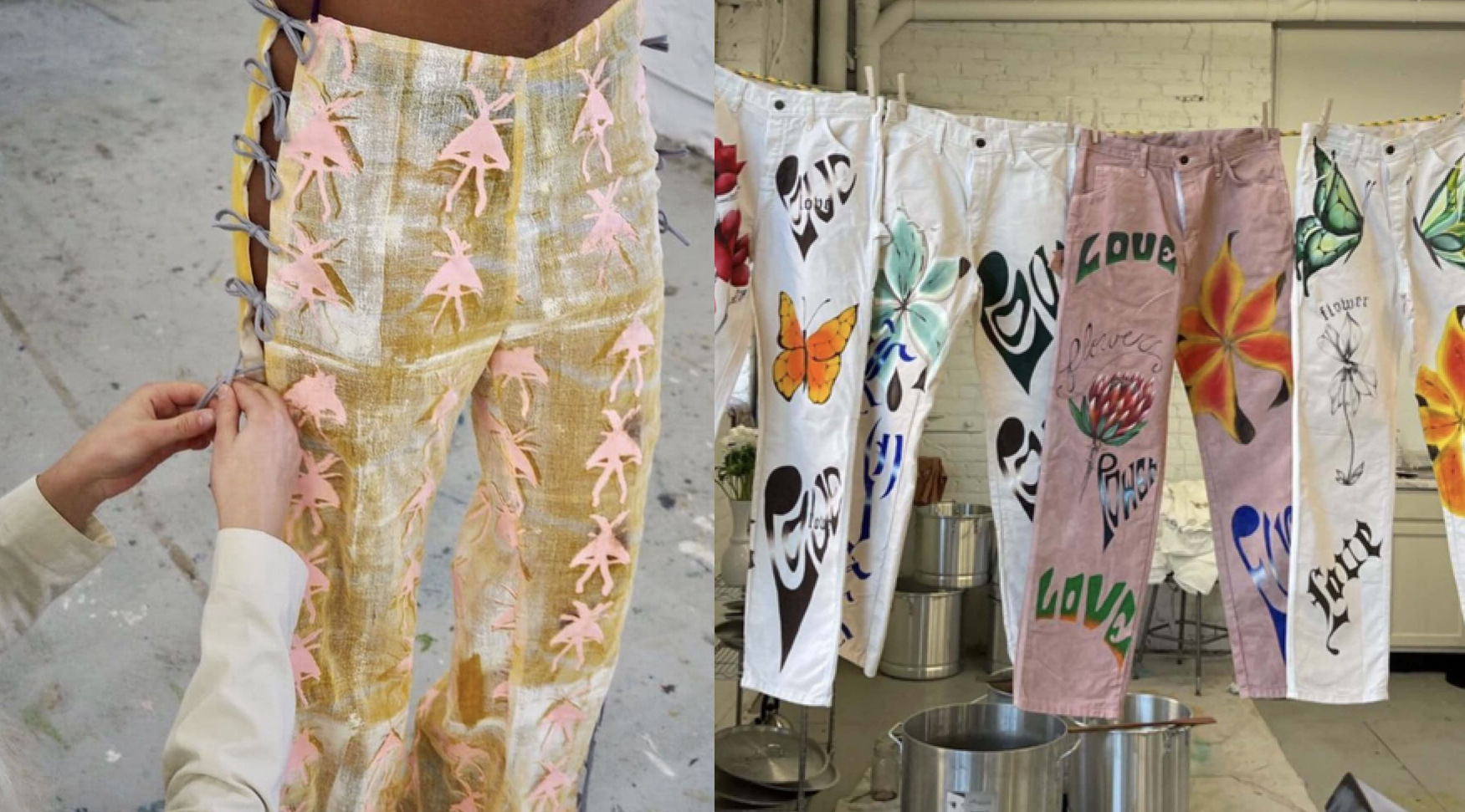
Final Thoughts
What ties these projects together isn’t a shared methodology or output; it’s a mindset. One that sees fashion management not as a back-end function, but as a strategic, ethical, and human-centred discipline. From sourcing policy to digital fatigue, co-creation to consumption, these graduates are helping to shape what comes next. And in doing so, they remind us that systems change doesn't start with tools. It starts with people.
A huge congratulations to all of AMFI’s 2025 Fashion & Management graduates - not just the four featured here, but the entire cohort whose work challenges the industry to think deeper, act smarter, and lead with greater responsibility. With emerging talent like this stepping into the fold, the future of fashion feels more considered, more collaborative, and more human.
To those reading: whether you’re looking for fresh collaborators, eager to mentor new voices, or simply curious to explore these projects further, we encourage you to reach out and connect!
The future of fashion systems isn’t just being imagined...it’s being built, right here and now, by this next generation of believers.
Editor’s Note: ‘Fashion Futures: Class in Session’ is a Seamless series that dives into the schools, students, and educators reshaping the industry from the ground up. By exploring pioneering programmes, breakthrough research, and the bold ideas of tomorrow’s talent, we uncover how fashion education is evolving to meet the challenges and opportunities of a radically changing world.
Missed the previous instalment of 'Fashion Futures: AMFI Class in Session'? Explore the Design graduate showcase from AMFI’s Class of ’25 now.

